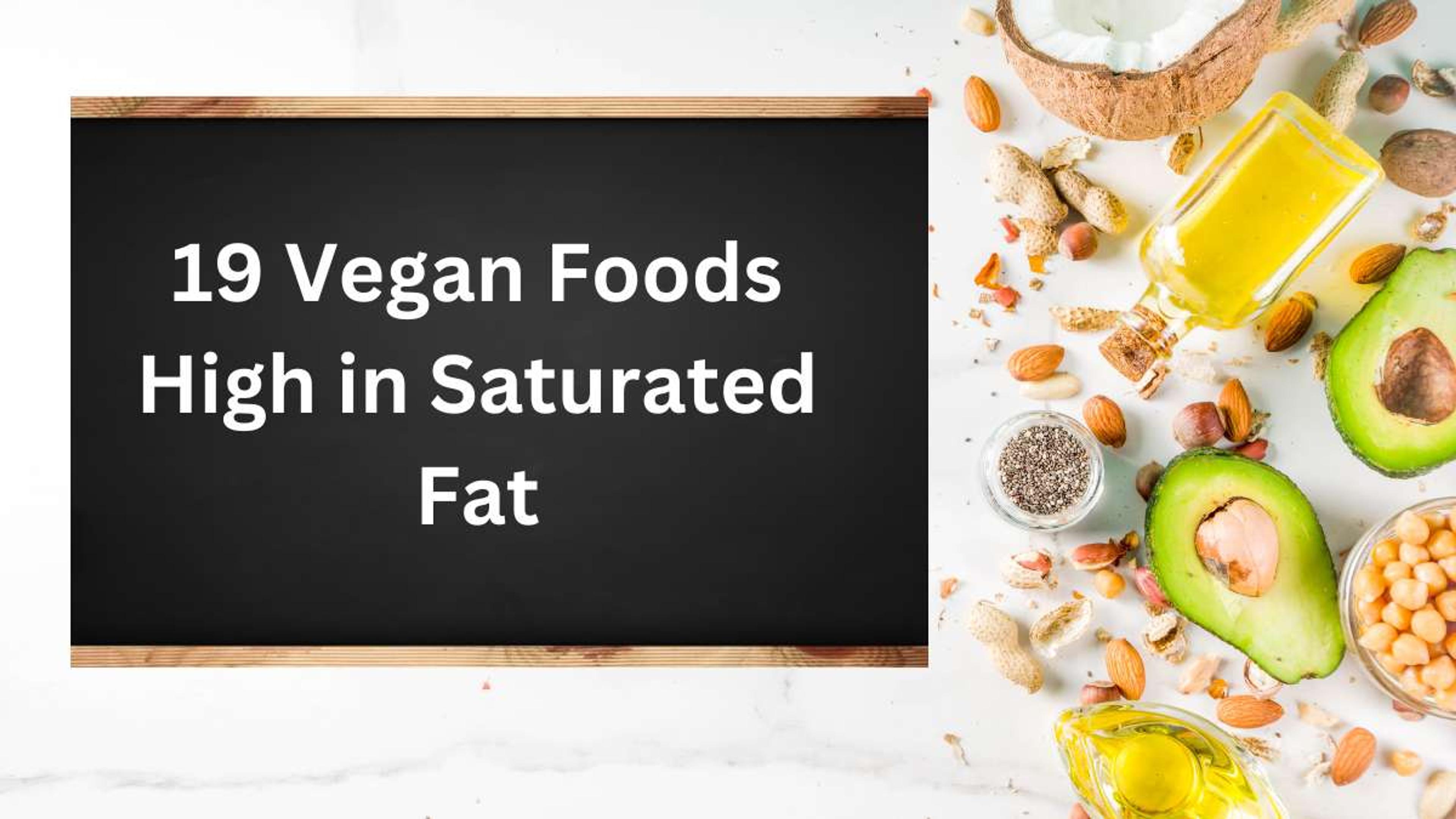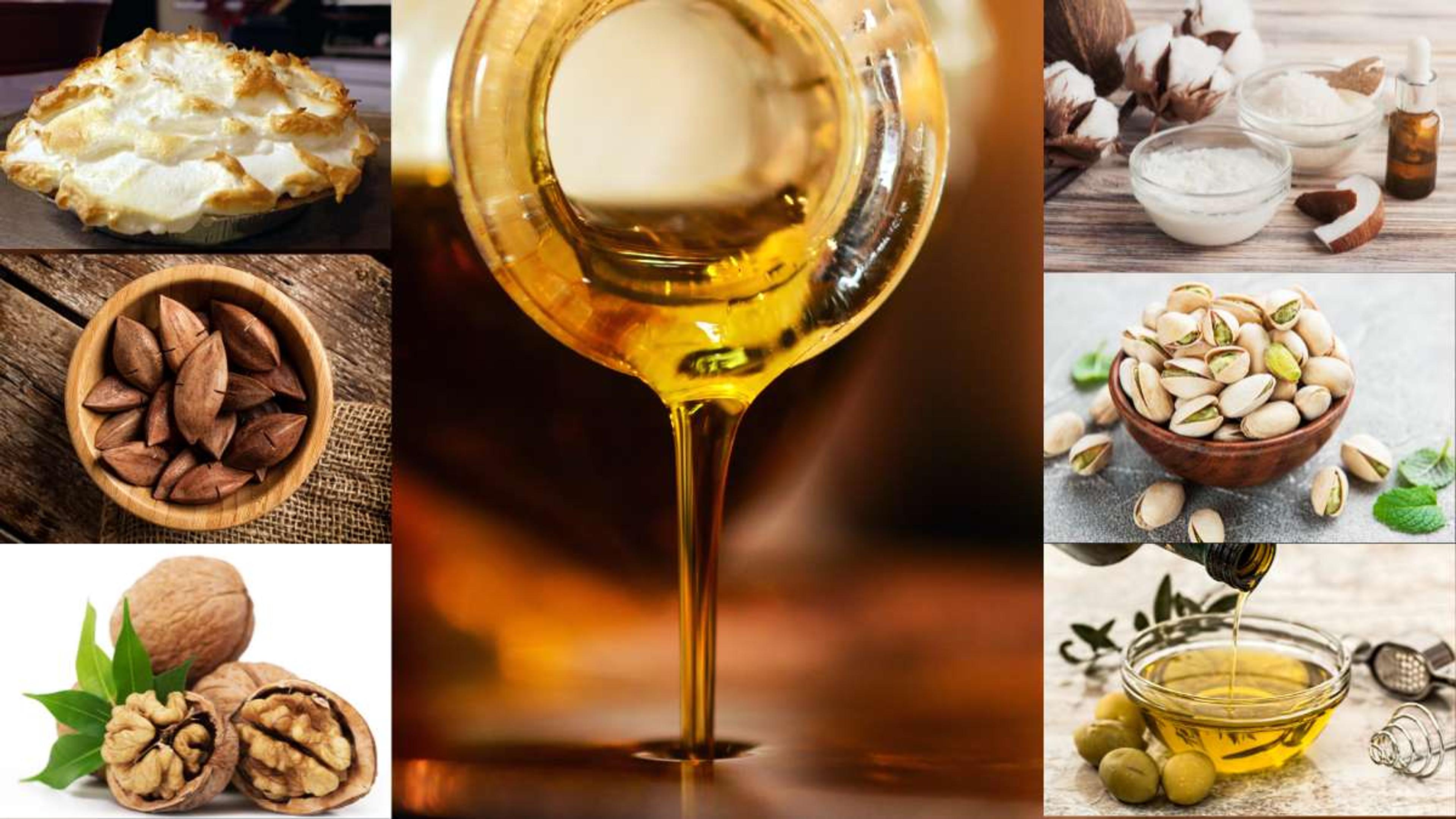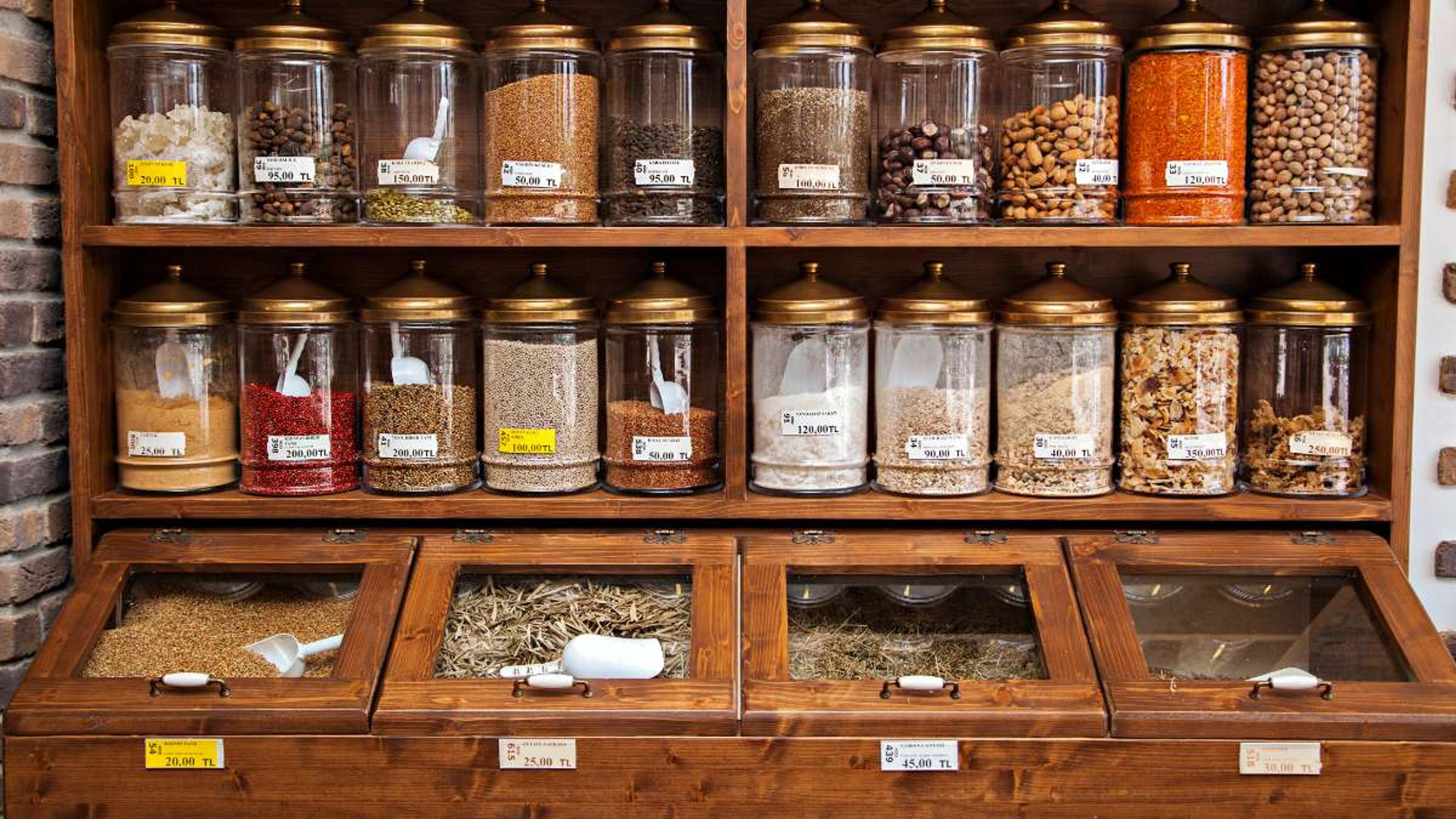Vegan Foods High in Saturated Fat: 19 Foods and Health Implications

- Key Takeaways
- Types of Fats in a Vegan Diet
- 19 Vegan Foods High in Saturated Fat
- The Health Implications of Vegan Saturated Fat Consumption
- Reducing Saturated Fat in a Vegan Diet
- Debunking Myths and Recommendations
- Conclusion
- FAQs
People often think that all fats in a vegan diet are heart-healthy, but even plant-based foods can contain saturated fats. Even though they are free from animal sources, diets high in this type of fat may increase your cholesterol levels.
This blog will guide you through the top 19 vegan foods containing high amounts of saturated fat, their health implications and how to manage them efficiently.
Ready to dive into the world of healthy yet balanced vegan eating?.
Key Takeaways
- Vegan diets can still contain high amounts of saturated fat, which can increase cholesterol levels and potentially lead to heart disease.
- Coconut oil, pili nuts, coconut cream, and macaroons are some vegan foods that are surprisingly high in saturated fat and should be consumed in moderation.
- Healthy alternatives like olive oil, flaxseed oil, cashews, peanuts, sesame seeds, pecans, walnuts, pistachios, pine nuts,
- It's important to be mindful of overall saturated fat intake and consider incorporating these healthier alternatives into your meals to promote heart health.
Types of Fats in a Vegan Diet
Vegan diets consist of different types of fats, including saturated, unsaturated, and trans fats.
Differentiating between saturated, unsaturated, and trans fats
Saturated fats, unsaturated fats, and trans fats are all dietary lipids but they differ in chemical structure and health impact. Saturated fats have no double bonds between carbon atoms and are usually solid at room temperature like cheese, butter, coconut oil or palm oil.
They can raise LDL cholesterol levels which may increase the risk of heart disease. Unsaturated fats, on the other hand, have one or more double bonds. This category includes monounsaturated and polyunsaturated fats found in olives, sunflower seeds, flaxseed oil, hemp seeds among others.
These healthy fats can lower bad cholesterol levels when used instead of saturated fats in your diet.
Trans fat is artificially created during food processing by adding hydrogen to liquid vegetable oils making them more solid. Consumption of these harmful substances is linked to higher risks of obesity and cardiovascular diseases as they not only raise bad cholesterol levels but also decrease good cholesterol that protects against heart disease.
19 Vegan Foods High in Saturated Fat
Here are 19 vegan foods that are surprisingly high in saturated fat. Don't miss out on this important information to make informed choices about your diet.

1. Coconut Oil
Coconut oil stands out in the vegan diet as a rich source of saturated fat, making up more than 80% of its composition. Interestingly enough, it solidifies at room temperature due to this high content.
This unique plant-based fat provides about 12 grams of saturated fat per tablespoon! Your body benefits from coconut oil's richness in medium-chain fatty acids which are metabolized easily.
A perk of including coconut oil in your nutrition plan is its ability to boost healthy cholesterol levels, contributing positively to heart health.
2. Pili Nut
Pili nuts have earned their spot on our list, boasting a high concentration of saturated fats. Just a 30-gram serving of these robust nuts delivers an impressive 24 grams of total fat.
If you find yourself indulging in a full cup, be aware that it's feeding your body around 37g of concentrated saturated fat - equivalent to about 210% and 150% of the recommended daily intake for women and men respectively.
Despite this hefty dose, pili nuts are not solely about fats; they also offer up three grams of protein per serving. With their rich, buttery flavor, they make for delicious snacks but should be consumed in moderation due to the high-fat content.
3. Coconut Cream
One cup of canned coconut cream contains a whopping 46 grams of saturated fat, making it one of the highest sources of saturated fat in vegan foods. Coconut cream is often used as an alternative in vegan and ketogenic recipes, but its high saturated fat content should be consumed in moderation.
While some plant-based food products can be healthy options, including coconut cream, its high levels of saturated fat may not make it beneficial for weight loss goals. It's important to be mindful of the amount consumed to maintain a balanced diet.
4. Nutmeg
Nutmeg is a spice that adds flavor to many dishes, but it also contains saturated fat. In fact, just one teaspoon of nutmeg contains 0.57 grams of saturated fat. For women, this amount makes up about 3% of the daily recommended intake, while for men it's about 2%.
So, if you're watching your saturated fat consumption on a vegan diet, it's important to be mindful of how much nutmeg you use in your cooking and baking.
5. Macaroons
Macaroons, a popular treat associated with vegan foods, can contribute to saturated fat intake due to their coconut content. One serving of French Macaroons contains 4.8 grams of saturated fat, which accounts for approximately 27% of the daily recommended intake for women and 19% for men.
Coconut flour, commonly used in macaroons, is also high in saturated fat with 13.3 grams per serving. While macaroons can be enjoyed as an occasional indulgence, it's important to be mindful of their saturated fat content when incorporating them into a balanced diet.
6. Brazil Nut
Brazil nuts are a great addition to a vegan diet, as they provide healthy fats, protein, fiber, and antioxidants. These nuts can actually help improve heart health due to their high content of monounsaturated and polyunsaturated fats.
It's important to note that Brazil nuts do have a high fat content in general, with 19 grams of fat per serving. Specifically, each serving contains 7 grams of monounsaturated fats, 7 grams of polyunsaturated fats, and 4.6 grams of saturated fats.
Additionally, Brazil nuts are also a good source of protein with 4 grams per serving.
7. Soybean Oil
Soybean oil is one of the 19 vegan foods that are high in saturated fat. While soy products like tofu and tempeh are popular among vegans for their protein content, soybean oil can have health implications due to its high saturated fat content.
Consuming processed soy patties or cheese made with soybean oil can actually raise cholesterol levels in vegans. It's important for individuals following a vegan diet to be mindful of their overall saturated fat intake and consider healthier alternatives for cooking and food preparation.
8. Sesame Oil
Sesame oil is one of the vegan foods that are high in saturated fat. It belongs to a group of 19 plant-based foods that contain this type of fat. Saturated fats in sesame oil can contribute to increased cholesterol levels and potentially raise the risk of cardiovascular diseases.
While sesame oil may add flavor to your dishes, it's important to be mindful of its saturated fat content and consider healthier cooking alternatives when possible.
9. Olive Oil
Olive oil is a commonly used ingredient in vegan cooking and offers numerous health benefits. Find out how it compares to other saturated fat sources! Read more about the potential health implications of vegan saturated fat consumption here.
10. Flaxseed Oil
Flaxseed oil is one of the vegan foods that contain high amounts of saturated fat. It is considered a potential functional food source and is rich in alpha-linolenic acid (ALA), which is an omega-3 fatty acid.
However, it's important to note that our bodies need to convert ALA into EPA and DHA for optimal health benefits. Flaxseed oil can be a good addition to a vegan diet, but it's essential to consume it in moderation due to its saturated fat content.
11. Cashews
Cashews are a nutritious addition to a vegan diet. They are packed with heart-healthy fats, fiber, and plant protein. Cashews also provide essential nutrients like copper, magnesium, and manganese.
Incorporating cashews into your diet can have positive effects on weight management and may offer various health benefits due to their antioxidant content. However, it's important to consume them in moderation as there may be potential side effects associated with excessive consumption of cashews.
12. Peanuts
Peanuts are a fantastic addition to a vegan diet due to their numerous health benefits. They contain essential B vitamins, vitamin E, monounsaturated fats (MUFA), polyunsaturated fats (PUFA), fiber, and phytochemicals.
These nutrients make peanuts a functional food with protective effects on the body. Not only are they packed with healthy fats and protein, but they also provide valuable fiber. Additionally, other nuts like almonds, walnuts, pecans, cashews, and seeds such as sunflower seeds offer similar benefits in terms of healthy fats and protein content.
It's worth noting that peanut skins have nutritional value and potential health benefits as well. Extensive research has been conducted on the chemical composition and nutritional value of peanuts and peanut butter.
13. Sesame Seeds
Sesame seeds are packed with essential nutrients, including fat, protein, minerals, vitamins, and dietary fiber. They are also a great source of sesame oil, which is obtained through traditional methods and is rich in nutrients as well.
Both sesame seeds and sesame oil have been the subject of scientific research due to their potential health benefits.
14. Pecan
Pecans are a healthy food choice for vegans due to their nutrient composition and potential health benefits. They contain about 65 to 70 percent oils, primarily composed of oleic and linoleic fatty acids.
Pecans are naturally low in calories, fat, sodium, and sugar, making them a suitable snack option for those following a vegan diet. Additionally, regularly consuming pecans can improve cardiometabolic risk factors and decrease the risk of cardiovascular disease.
So next time you're looking for a nutritious plant-based snack, consider reaching for some delicious pecans!
15. Walnut
Walnuts, a key component of the Mediterranean diet, offer a range of health benefits. Rich in polyphenols, walnuts have been shown to help lower blood lipids and decrease inflammation markers.
Combining walnuts with olive oil has been associated with improved levels of blood lipids and reduced inflammation. Including walnuts in your diet can be a great way to promote heart health and overall well-being.
16. Pistachio
Pistachios have a high fat content, with 46% to 76% of their composition being fat. In every ounce of pistachios, there is a total fat content of 12.7 grams, including 1.5 grams of saturated fat.
Despite their higher fat content, pistachios are still considered a nutritious snack option because they provide various nutrients and bioactives that could potentially have positive health effects.
17. Pine Nut
Pine nuts are rich in fats, but they contain "good" fats that can actually help lower cholesterol levels. These nuts are packed with pinolenic acid, a type of polyunsaturated fatty acid that has been linked to improved heart health.
Including pine nuts in your diet, along with other plant-based foods, can help reduce the risk of heart disease when consumed as part of a healthy eating plan. So go ahead and enjoy these nutritious nuts as a tasty addition to your meals or snacks!
18. Hemp Seeds
Hemp seeds are a nutritional powerhouse, packed with plant-based protein and fiber. These tiny seeds are also rich in beneficial fatty acids like omega-3s and omega-6s, which are important for heart health.
In addition to their impressive nutrient profile, hemp seeds have antioxidant properties that can help protect against cellular damage. They also support digestive health due to their high fiber content.
Furthermore, hemp seed oil has antimicrobial and anti-inflammatory effects, making it a potential treatment option for conditions such as acne. So, incorporating hemp seeds into your diet is a great way to boost your overall nutrition and promote optimal well-being.
19. Hazelnut
Hazelnuts are a great addition to a vegan diet due to their high content of monounsaturated fatty acids, similar to olive oil. This makes hazelnut cooking oil an excellent alternative for those looking for healthier fat options.
Additionally, hazelnuts contain Omega 9 and Omega 6 fatty acids, which are beneficial for heart health and overall well-being. Whether enjoyed raw or roasted, hazelnuts offer a good amount of phenolic acid, which has antioxidant properties.
These energy-dense nuts provide a favorable fatty acid profile, making them a nutritious snack or ingredient for various dishes.
The Health Implications of Vegan Saturated Fat Consumption
Consuming high amounts of saturated fat in a vegan diet can have significant health implications, including an increased risk of cardiovascular disease and inflammation-related chronic diseases.

Balancing saturated fat intake with other dietary factors for optimal health
Balancing saturated fat intake with other dietary factors is crucial for optimal health. It is recommended to reduce saturated fat intake to less than 10% of total energy intake in order to minimize the risk of weight gain and increased blood cholesterol levels.
By following a plant-based diet that emphasizes whole grains, legumes, fruits, and vegetables, you can reduce the intake of saturated fat found in animal-based foods. This contributes to a healthier heart and lowers the risk of heart disease.
Remember that vegetarian diets are associated with increased consumption of plant-based foods, which are beneficial for overall health. So, make sure to balance your saturated fat intake with other healthy dietary choices for optimal well-being.
Consuming saturated fat can have a significant impact on cholesterol levels and cardiovascular health. Saturated fats are known to increase the levels of "bad" LDL cholesterol in the body, which can contribute to the development of heart disease.
Foods high in cholesterol also tend to be higher in saturated fats, making it important to monitor their intake. On the other hand, plant-based diets have been shown to lower the risk of stroke by reducing cholesterol levels.
Research has consistently found that saturated fat has more detrimental effects on cardiovascular health compared to unsaturated fats. It is crucial for individuals following a vegan diet or any other diet to be mindful of their saturated fat intake for optimal heart health.
The role of saturated fat in inflammation and chronic diseases
Consuming excessive amounts of saturated fat has been linked to inflammation and the development of chronic diseases. Diets high in saturated fats can lead to increased levels of certain inflammatory markers in the body, contributing to conditions such as heart disease, diabetes, and obesity.
Inflammation is a natural response by the immune system, but chronic inflammation can be harmful over time. By reducing our intake of foods high in saturated fat, we can help lower inflammation levels and potentially decrease the risk of developing chronic diseases.
Potential effects of excessive saturated fat intake
Excessive saturated fat intake can have detrimental effects on our health. Consuming too much saturated fat has been linked to an increased risk of heart disease, high cholesterol levels, and inflammation in the body.
Research shows that a diet high in saturated fats can contribute to the development of atherosclerosis, which is the hardening and narrowing of arteries due to plaque buildup. This can impede blood flow and increase the risk of heart attacks and strokes.
Additionally, excessive saturated fat intake may also lead to weight gain and obesity, as these foods are often high in calories. It's important to be mindful of our saturated fat consumption and opt for healthier alternatives that are low in saturated fats but rich in unsaturated fats instead.
Reducing Saturated Fat in a Vegan Diet
To minimize saturated fat intake while following a vegan lifestyle, it is important to choose healthier fat alternatives for cooking and food preparation.

Tips for minimizing saturated fat intake while following a vegan lifestyle
- Choose plant-based oils for cooking and baking, such as olive oil, flaxseed oil, and hemp seed oil.
- Incorporate more whole foods into your diet, such as fruits, vegetables, whole grains, legumes, and nuts.
- Replace coconut products with lower saturated fat options like almond milk or soy yogurt.
- Opt for lean sources of plant-based protein, like tofu, tempeh, lentils, and chickpeas.
- Use avocado or nut butter instead of margarine or butter on toast or sandwiches.
- Limit processed vegan foods that are high in saturated fats, like vegan cheese and mock meats.
- Experiment with flavorful herbs and spices to enhance the taste of your meals without relying on added fats.
- Make homemade dressings using ingredients like vinegar, lemon juice, mustard, and herbs instead of store-bought dressings that can be high in saturated fats.
- Be mindful of portion sizes when consuming higher-fat plant-based foods like nuts and seeds.
- Stay hydrated by drinking plenty of water throughout the day to help maintain a healthy weight.
Remember that following a vegan lifestyle doesn't automatically mean a low-saturated-fat diet; it's important to be aware of the choices you make within this dietary framework in order to maintain optimal health benefits. Healthier fat alternatives for cooking and food preparation
Plant-based diets can still include healthy sources of fat for cooking and food preparation. Here are some options to consider:
- Avocado oil: Rich in monounsaturated fats, avocado oil is a great choice for sautéing or roasting vegetables.
- Olive oil: A staple in Mediterranean cuisine, olive oil provides monounsaturated fats that can enhance the flavor of salads and cooked dishes.
- Flaxseed oil: High in omega-3 fatty acids, flaxseed oil is a beneficial addition to salad dressings or smoothies.
- Hemp seed oil: Another source of omega-3 fats, hemp seed oil can be used in salad dressings or drizzled over roasted vegetables.
- Almond butter: Made from ground almonds, almond butter is a nutritious spread for toast or as an ingredient in baked goods.
- Chia seeds: These tiny seeds are packed with omega-3 fats and can be added to yogurt, oatmeal, or smoothies for a nutritional boost.
- Coconut milk: While coconut cream is high in saturated fat, lighter alternatives like coconut milk can still add richness to curries and soups without excessive saturated fat content.
- Sunflower seed butter: An alternative to peanut butter, sunflower seed butter offers healthy fats and can be used as a spread or dip.
- Sesame tahini: Made from sesame seeds, tahini adds creaminess to recipes like hummus or salad dressings.
It is important to remember to incorporate vegan foods with saturated fat in moderation, not too much & not too less - just the right intake would do the magic!
Debunking Myths and Recommendations
In this section, we will address common misconceptions about vegan saturated fat and seek input from nutrition experts and health professionals to provide evidence-based recommendations.
Addressing common misconceptions about vegan saturated fat
Many people have misconceptions about vegan diets and saturated fat. One common misconception is that all vegan food is healthy and low in saturated fat. However, it's important to remember that just because a food is plant-based doesn't mean it's automatically healthy or low in saturated fat.
In fact, there are many vegan foods that are high in saturated fats, such as coconut oil and coconut cream. Another misconception is that vegans don't get enough protein. It's true that plant-based sources of protein may differ from animal sources, but with proper planning, it's absolutely possible for vegans to meet their protein needs.
By debunking these myths and providing accurate information about vegan diets and saturated fat, we can help promote a better understanding of nutrition for those interested in adopting a vegan lifestyle.
Seeking input from nutrition experts and health professionals
Nutrition experts and health professionals are actively seeking input to address the myths surrounding vegan foods high in saturated fat. They are committed to making evidence-based recommendations that promote a balanced and healthy plant-based diet.
By analyzing the latest research and consulting with experts in the field, they aim to provide accurate information about the impact of saturated fat on overall health. Their insights will help individuals make informed decisions about their dietary choices, ensuring that they can maintain optimal health while following a vegan lifestyle.
Conclusion
In conclusion, while a vegan diet is generally associated with being low in saturated fat and beneficial for overall health, it's important to be aware of the specific vegan foods that can still be high in saturated fat.
By understanding which plant-based options are higher in saturated fat, individuals can make informed choices to optimize their health. Additionally, incorporating healthier alternatives and balancing saturated fat intake with other dietary factors can help promote heart health and reduce the risk of chronic diseases.
FAQs
1. What are some vegan foods that are high in saturated fat?
Some vegan foods that are high in saturated fat include coconut oil, palm oil, cocoa butter, and certain types of nuts and seeds like macadamia nuts and chia seeds.
2. Are there any benefits to consuming vegan foods high in saturated fat?
While it is generally recommended to limit intake of saturated fats for overall health, some plant-based sources of saturated fats can provide essential nutrients such as lauric acid from coconut oil or antioxidants from cocoa butter. However, it is important to consume these foods in moderation as part of a balanced diet.
3. What are the health implications of consuming too much saturated fat from vegan sources?
Consuming excessive amounts of saturated fat, even from plant-based sources, can increase your risk for cardiovascular diseases such as heart disease and stroke. It is important to prioritize a diet rich in unsaturated fats from sources like avocados, nuts, and olive oil.
4. How can I incorporate healthier fats into a vegan diet without relying on saturated fats?
There are many healthier options for incorporating fats into a vegan diet without relying heavily on saturated fats. Some examples include using avocado or nut butters as spreads instead of margarine or adding flaxseeds or chia seeds to meals for omega-3 fatty acids. Cooking with oils like olive oil or using vegetable-based spreads can also be beneficial alternatives.

